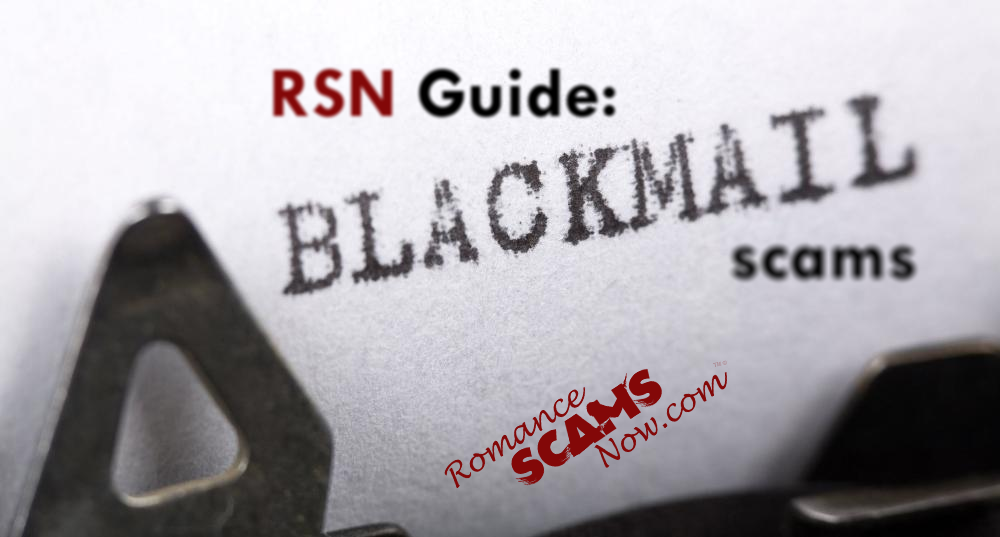RSN™ Guide: Avoiding The Latest Blackmail Scam
Scammers Are Experts At Manipulation, We Know This, Right?
But their expertise runs to far more than just romance scams. It includes a range of blackmail scams and extortion online as well.
Many of you have experienced scammers treats and extortion attempts at the end of a romance scam, from public shaming to treats of killing your children.
Another type of scam they engage in is the randomize “I know You Have Been Naughty” scam
In this they contact people online, usually based upon things they see in your social media profile.
They look for victims based upon what you show in your Facebook (or other profiles):
- Married
- Have children
- Are a professional or business person
- Important job or own business
- Is a politician (a favorite) or public/government job holder
- School or university teachers
These are some of the people that are most vulnerable to these kinds of blackmail threats.
How Does This Blackmail Actually Work?
You get an email or instant message or could even be a text message on your hone.
“I know about the secret you are keeping from your wife and everyone else. You can ignore this letter, or pay me a $8600 confidentiality fee in Bitcoin”.
It’s enough to send shivers down anyone’s spine, but these chilling words are part of a new scam targeting men (though there actually are variations that target women and gays – especially gays).
black·mail
ˈblakˌmāl/Noun: the action, treated as a criminal offense, of demanding money from a person in return for not revealing compromising or injurious information about that person.
“they were acquitted of charges of blackmail.” Synonyms: extortionVerb: demand money from (a person) in return for not revealing compromising or injurious information about that person.
“trying to blackmail him for $400,000.” Synonyms: extort money from, threaten; informal demand hush money from “he was blackmailing the murderer”
Here’s how it works.
Scammers have been sending letters (emails, instant messages, etc.) to men, demanding payments using bitcoin in exchange for keeping quiet about alleged affairs. Though it can be any form of payment from cash sent by MoneyGram to iTunes cards.
The letter also explains how to use bitcoin to make the payment – this is critical since most people have no clue how to do this!
Make no mistake, this is not spam, this is a criminal extortion attempt to separate people from their money.
If you — or someone you know — get a message like this, report it immediately to your local police, Anyscam.com, and the FBI.
Do Not Make A Payment – Do Not Respond
Threats, intimidation and high-pressure tactics are classic signs of a scam. Learn how to stay ahead of clever crooks with these practical tips, and check out the ways you can keep your personal information secure.
Things to remember about scammer threats:
- Most scammers are thousands of miles away from you – they are not like the mafia with people everywhere – even if they say they are.
- Scammers work off of the odds, meaning they cannot waste time on people that do not pay. If you don’t pay, they don’t waste their time with you – their time is too important.
- Never get a scammer angry, just block and never talk to them. Angry people do things differently. Never accuse a scammer, just block them. Silence is your best defense.
- They will almost never follow through with the threat to expose something even if they have it because they will want your money. If they expose something it loses all value for them, and they may want to come back later. Block Block Block!
- Always report all forms of extortion and blackmail to your police because it just might be someone local after all.
- Worst case, what if it does happen? In today’s world of photoshopped fakes, no matter what a photo may be, you can always tell the world it wasn’t you after all and just laugh it off – unless they caught you murdering someone!
So stop worrying and just do the right thing – block and report – then forget about it!
Anti-Scam Tips
Crooks use clever schemes to defraud millions of people every year. They often combine new technology with old tricks to get people to send money or give out personal information. Here are some practical tips to help you stay a step ahead:
- Spot imposters. Scammers often pretend to be someone you trust, like a government official, a family member, a charity, or a company you do business with. Don’t send money or give out personal information in response to an unexpected request — whether it comes as a text, a phone call, or an email.
- Do online searches. Type a company or product name into your favorite search engine with words like “review,” “complaint” or “scam.” Or search for a phrase that describes your situation, like “IRS call.” You can even search for phone numbers to see if other people have reported them as scams. You can also do searches on images!
- Don’t believe your caller ID. Technology makes it easy for scammers to fake caller ID information, so the name and number you see aren’t always real. If someone calls asking for money or personal information, hang up. If you think the caller might be telling the truth, call back to a number you know is genuine.
- Don’t believe an email address or website. Scammers are good at “Spoofing” and pretending to be from an email or web address.
- Don’t pay upfront for a promise. Someone might ask you to pay in advance for things like debt relief, credit and loan offers, mortgage assistance, or a job. They might even say you’ve won a prize, but first, you have to pay taxes or fees. If you do, they will probably take the money and disappear.
- Consider how you pay. Credit cards have significant fraud protection built in, but some payment methods don’t. Wiring money through services like Western Union or MoneyGram is risky because it’s nearly impossible to get your money back. That’s also true for reloadable cards (like MoneyPak or Reloadit) and gift cards (like iTunes or Google Play). Government offices and honest companies won’t require you to use these payment methods.
- Talk to someone. Before you give up your money or personal information, talk to someone you trust. Con artists want you to make decisions in a hurry. They might even threaten you. Slow down, check out the story, do an online search, consult an expert — or just tell a friend.
- Hang up on robocalls. If you answer the phone and hear a recorded sales pitch, hang up and report it to the FTC. These calls are illegal, and often the products are bogus. Don’t press 1 to speak to a person or to be taken off the list. That could lead to more calls.
- Be skeptical about free trial offers. Some companies use free trials to sign you up for products and bill you every month until you cancel. Before you agree to a free trial, research the company and read the cancellation policy. And always review your monthly statements for charges you don’t recognize.
- Don’t deposit a check and wire money back. By law, banks must make funds from deposited checks available within days, but uncovering a fake check can take weeks. If a check you deposit turns out to be a fake, you’re responsible for repaying the bank.
Sign up for free scam alerts from Romance Scams Now and stay informed.
RSN Team
a division of SCARS
Miami Florida U.S.A.
– – –
WESTERN UNION REPAYMENT PROGRAM NEWS
FOR THE LATEST INFORMATION ABOUT THE WESTERN UNION REPAYMENT / REMISSION PROGRAM CLICK HERE – IT IS STILL OPEN FOR A PETITIONS FOR REPAYMENT
– – –
Tell us about your experiences with Romance Scammers in our Scams Discussion Forum on Facebook »
FAQ: How Do You Properly Report Scammers?
It is essential that law enforcement knows about scams & scammers, even though there is nothing (in most cases) that they can do.
Always report scams involving money lost or where you received money to:
- Local Police – ask them to take an “informational” police report – say you need it for your insurance
- Your National Police or FBI (www.IC3.gov)
- The Scars Worldwide Reporting Network HERE or on www.Anyscam.com
This helps your government understand the problem, and allows law enforcement to add scammers on watch lists worldwide.
Visit our NEW Main SCARS™ News & Information Facebook page for much more information about scams and online crime: www.facebook.com/SCARS.News.And.Information
To learn more about SCARS visit www.AgainstScams.org
Please be sure to report all scammers HERE or on www.Anyscam.com
All original content is Copyright © 1991 – 2018 SCARS All Rights Reserved Worldwide & Webwide – RSN/Romance Scams Now & SCARS/Society of Citizens Against Romance Scams are all trademarks of Society of Citizens Against Romance Scams Inc.
#ReportingScammers #WhereToReportScams #Anyscam #SCARS #RSN #CatchScammers #ScammerWatchLists #ArrestScammers #REPORTSCAMMERS #ANYSCAM #AVOIDSCAMS #ROMANCESCAMS #ACTAGAINSTSCAMS #NIGERIANSCAMMERS #ROMANCESCAMSNOW #SCARS #GHANASCAMMERS #FAKEPROFILES #FACEBOOKSCAMMERS #BOYCOTTAFRICANCOFFEE





Leave A Comment